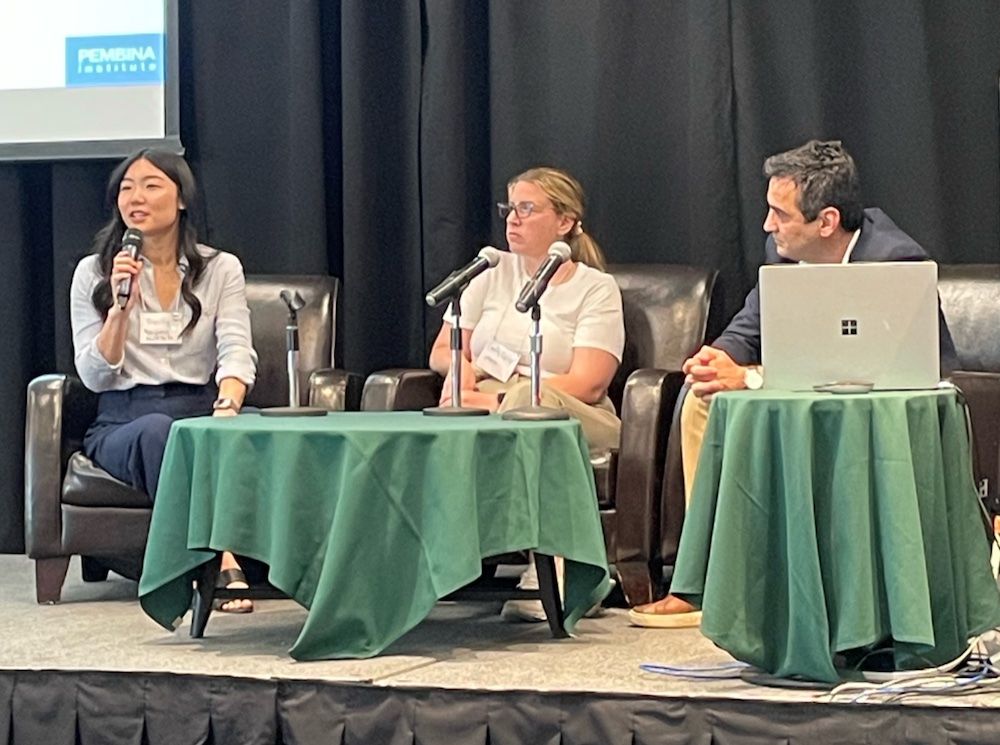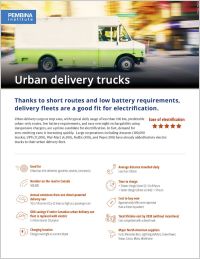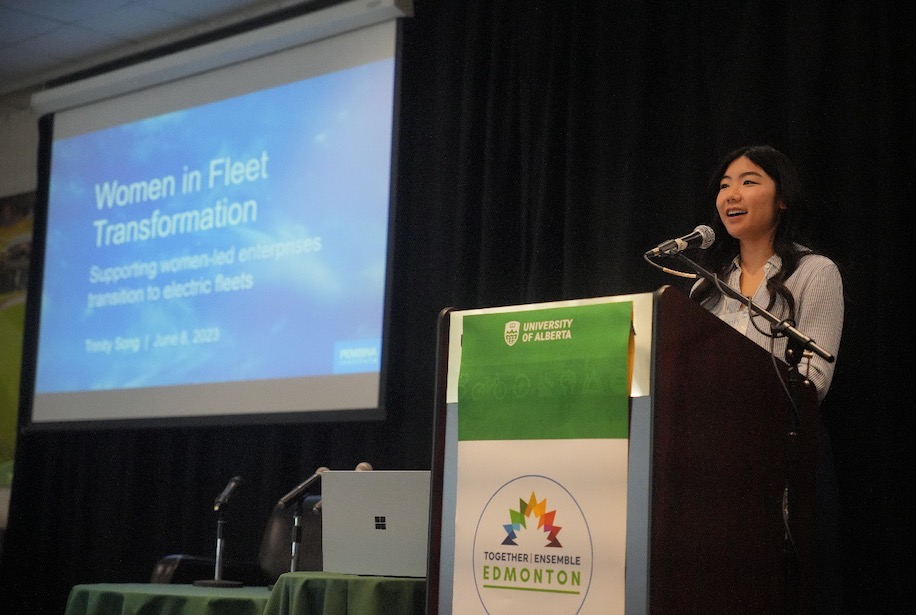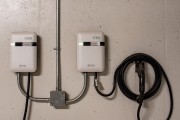As an analyst on Pembina Institute’s Equitable Transition team, I have the privilege of working in a policy area that pairs climate action with gender equity. As we move towards an energy transition, it is important that we put people, equity and inclusion at the center of climate policy. Our team is thrilled to share we are partnering with City of Edmonton and Alberta Ecotrust to develop a program in support of women-led businesses that will lead the way to a cleaner tomorrow.
In June, I had the opportunity to speak at the University of Alberta’s Together | Ensemble conference, a national conference that tracks progress on the United Nations’ Sustainable Development Goals. This year, the focus was on transit sustainability and equity, and I had the chance to speak about how to integrate gender equity with the transition to low-emission vehicles.

Diversity in transportation
When most of us think about people who work in the “transportation sector,” three types of workers might come to mind: drivers for taxis or Uber, long-haul truck drivers, and public transit operators.
But the transportation sector encapsulates a wide range of different types of service-based businesses – the owners of which would never consider themselves to be in transportation. A bakery with a delivery cube van, a caterer who drives a personal minivan with meals and equipment to events, or even a landscape and gardening company whose crews drive branded pick-up trucks to and from jobs.
Even if it isn’t their primary service, all these businesses are part of transportation. They’re also some of the most common types of businesses that make up the 17.5 per cent of businesses in Canada owned by women.
Women are significantly underrepresented as business owners and entrepreneurs because they face many unique barriers; from lack of access to capital in the form of loans and investments, to a lack of affordable or accessible childcare to allow them to dedicate as much time to grow their businesses at the same pace as men.
According to a report for the Toronto Metropolitan University’s Women Entrepreneurship Knowledge Hub, despite these challenges, women entrepreneurs are more likely to focus their business around social impact. They are also more likely to develop corporate objectives aimed at attaining gender equality and environmental sustainability. Women in leadership positions are more likely than men in similar roles to understand and make decisions to implement “green” policies.
 Why is this important? Well, communities across Canada are making commitments to reduce emissions from transportation and develop strategies to low or zero-emission vehicles—like electric vehicles (EV). Light-, medium- and heavy-duty vehicles that work within towns or cities present an actionable opportunity for a transition to EVs for municipal governments. Their short trips and returns to a home base each day mean they can be easily charged overnight and there is existing technology to retrofit cities with EV charging infrastructure.
Why is this important? Well, communities across Canada are making commitments to reduce emissions from transportation and develop strategies to low or zero-emission vehicles—like electric vehicles (EV). Light-, medium- and heavy-duty vehicles that work within towns or cities present an actionable opportunity for a transition to EVs for municipal governments. Their short trips and returns to a home base each day mean they can be easily charged overnight and there is existing technology to retrofit cities with EV charging infrastructure.
As cities begin developing these plans, it is essential that groups who are underrepresented in the industry, like women, are part of the process, so that the transition is not only sustainable but equitable as well.
Add your voice
The City of Edmonton has committed to reducing its greenhouse gas emissions by 35 per cent below 2005 levels by 2035. We are working with our project partners to recruit a cohort of women who can share their knowledge and experiences running businesses with a transportation component in Edmonton and surrounding areas, through a series of in person and virtual forums and workshops over the course of 2023 and 2024. The learnings will be used to advocate for polices and investments that will support low-emission transportation in Edmonton.
 If you’re a woman with a business in Edmonton or surrounding areas that uses at least one vehicle as part of that business, your voice is crucial to this conversation. Your leadership, experience and unique drive for sustainability, equity and success is essential to building an Edmonton that is equitable, prosperous and clean.
If you’re a woman with a business in Edmonton or surrounding areas that uses at least one vehicle as part of that business, your voice is crucial to this conversation. Your leadership, experience and unique drive for sustainability, equity and success is essential to building an Edmonton that is equitable, prosperous and clean.
Get in touch to learn more about the project.
Women delivering electric: Entrepreneurs leading the charge for an EV-friendly Edmonton is funded in part by Alberta Ecotrust Foundation’s Climate Innovation Grant Program.






